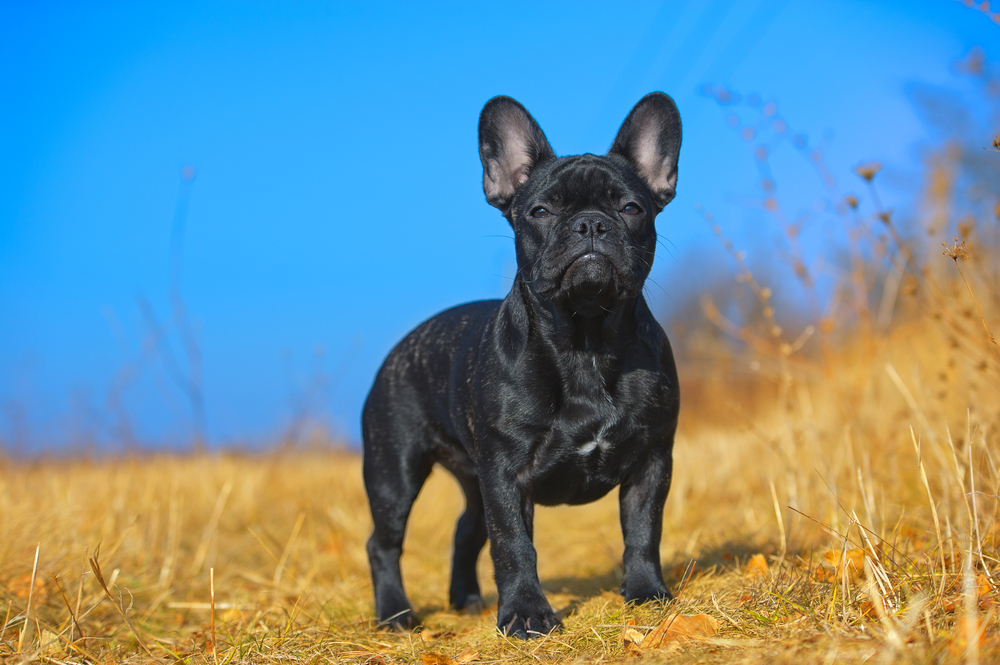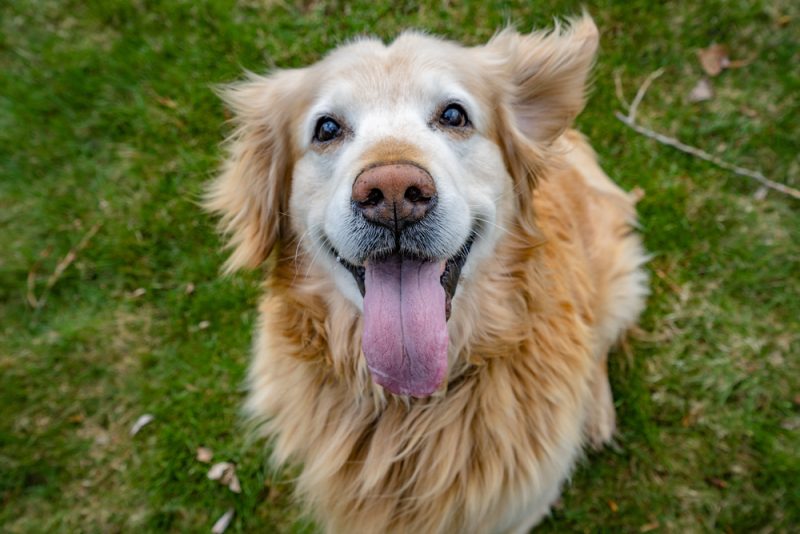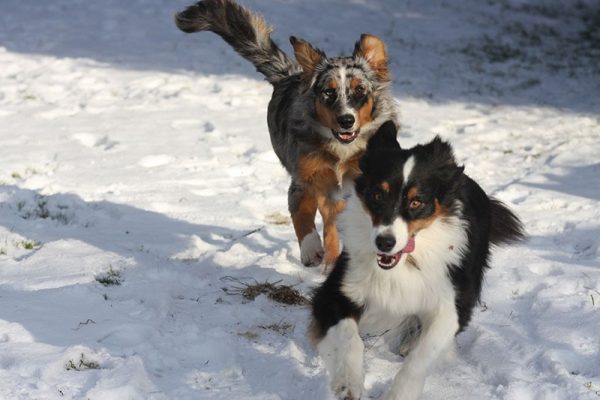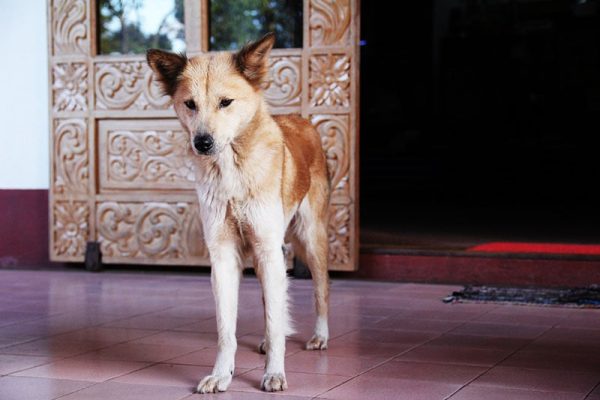In this article
View 8 More +French Bulldogs (affectionately nicknamed “Frenchies”) are beloved companion dogs with massive bat ears, a playful personality, and the adaptability to live anywhere from an urban apartment to a sprawling country home.
Though there’s a lot to love about the Frenchie, owning one comes with some very important considerations and responsibilities and ideally requires previous experience or knowledge of the most common health issues associated with brachycephalic breeds. Here’s everything you need to know about owning a French Bulldog.
Breed Overview
Height:
11–13 inches
Weight:
Under 28 pounds
Lifespan:
10–12 years
Colors:
White, brindle, fawn, cream, white and fawn, white and brindle, fawn and white, fawn brindle, brindle and white, and fawn, brindle, and white
Suitable for:
Owners familiar with brachycephalic breeds, singles, couples, families
Temperament:
Friendly, affectionate, fun-loving, silly
The Bouledogue Francais, or French Bulldog, is a brachycephalic dog breed that originated in England from toy-sized Bulldogs. After being crossed with other breeds in France, Frenchies had soon become popular, and this was quickly followed by the rest of Europe and America in the 19th century. These dogs soon became fashionable and associated with Parisian café life and fancy women. Famous artists, including Edgar Degas and Henri de Toulouse-Lautrec, have dogs resembling a French Bulldog as subjects in their paintings. They are believed to have been crossed with terrier breeds and Pugs.
French Bulldog Characteristics

French Bulldog Puppies

French Bulldogs recently dethroned the Labrador Retriever as the most popular dog in America.1 As loving as that sounds, it also raises a genuine concern about irresponsible and extreme breeding that is causing a rise in health issues in Frenchies due to a large demand for puppies. People all over the country want Frenchies, so there’s no shortage of breeders to get show-quality or pet-quality puppies in a range of colors. However, there are also puppies from various other sources and puppy mills that have been bred and raised in poor conditions and may come with an array of ailments that usually get significantly worse with age.
If you want a Frenchie, you need to understand the level of care and dedication they require, as it’s more than many other dog breeds and lasts for their entire life. You should familiarize yourself with the health issues they commonly suffer from and make sure to work with reputable breeders who perform health testing to try and reduce some of the conditions these dogs are prone to. Speaking to a veterinarian and working closely with the breeder is the best way to fully understand the scope of the care your new Frenchie will require, alongside the expected healthcare costs.
Frenchies also end up in shelters and rescues often, mostly due to developing expensive health problems, behavioral issues, or because the novelty wore off. As of 2023, French Bulldogs and other bulldog breeds are being surrendered to shelters at an alarming rate. In addition to general animal shelters and rescues, French Bulldogs may be found in breed-specific rescues.

Temperament & Intelligence of the French Bulldog

French Bulldogs are typical of a companion breed in that they are “Velcro dogs” and want to be close to their owners at all times. They are patient, affectionate, agreeable, and social, but they can have a stubborn streak. In a multi-person or multi-pet household, the Frenchie may feel competitive and jealous over attention, but this will greatly depend on their early socialization and training.
Are These Dogs Good for Families? 👪
French Bulldogs are ideal for families. They’re patient and agreeable for children, but it’s important that children learn to play appropriately with the dog. Frenchies are small and may have back or hip issues, so injuries from rough play can be devastating. You should also supervise interactions, especially with young children, to avoid any issues.
Does This Breed Get Along With Other Pets?
Frenchies were developed to be a best friend, not a hunting or sporting dog. They don’t have a high prey drive and can get along well with other dogs, cats, and even some small animals. However, it’s crucial to introduce pets carefully and supervise playtime to ensure play doesn’t escalate to aggression.

Things to Know When Owning a French Bulldog
If you want to bring home a French Bulldog, here are some things you need to know:
Food & Diet Requirements 🦴
Frenchies don’t have as high energy needs as working dogs, but they need a high-quality diet that’s appropriate for their life stage. These dogs are moderately active depending on their health, but still, overeating can quickly lead to obesity. Maintaining a healthy weight is vital to prevent not only associated health conditions but also some of the more specific health issues Frenchies are prone to that worsen with obesity.
Treats should be given in moderation, and no table scraps should be given at all. Check with your vet if you have concerns about your dog’s weight or body condition.

Exercise 🐕
French Bulldogs do not require a huge amount of exercise or space. Short walks in cool or moderate weather and play sessions are often enough to keep the Frenchie in good condition. They can compete in canine sports like agility and rally, but some individuals may be limited by breathing difficulties associated with their brachycephalic (short skull) head shape. Be careful exercising your Frenchie on hot or humid days, as it can be more difficult for them to breathe properly and they are prone to overheating.
Training 🎾
Frenchies have a desire to please and are generally easy to train, but they can be stubborn. It’s best to start socialization and obedience training early to develop good habits and limit reactivity. These dogs have huge personalities and can be excitable, which can turn into problem behaviors without appropriate outlets. Most Frenchies are food motivated, but be mindful of how many treats you feed to avoid obesity.
Grooming ✂️
The Frenchie has a short coat that doesn’t shed much. They only need to be brushed on a weekly basis to remove any loose hair. It’s important to clean Frenchie’s facial folds on a daily basis and according to your vet’s instructions to avoid dermatitis and other skin conditions that can develop. You should also trim your dog’s nails, if necessary and depending on the type of terrain they walk on, as well as brush their teeth and check their ears regularly.

Health and Conditions 🏥
Frenchies are front-heavy with narrow or stenotic nostrils, an elongated soft palate, and a flat face. All of this can contribute to breathing, eye, teeth, skin, and joint or back problems. They’re prone to brachycephalic obstructive airway syndrome or BOAS, which means they struggle to breathe properly. In some individuals, this exhibits even during rest or if they perform very gentle exercise.
They are particularly prone to overheating and should not be exercised or walked during the warm part of the day, as they may develop life-threatening heatstroke. Some dogs will require surgery to remove part of their soft palate or excessive tissue that forms balloon structures at the back of the throat and to widen their nostrils.
These dogs are not good swimmers and shouldn’t be in a tub, pool, or natural body of water unsupervised. Avoid exercising Frenchies in hot or humid conditions that worsen their breathing issues and predisposes them to overheating. They’re also banned by some commercial airlines because of the number of French Bulldogs that have died during flights.
These dogs are also sensitive to anesthesia and require special considerations from vets during surgery. Frenchies often struggle to deliver their puppies naturally, and most will require a C-section, which is generally a high-risk procedure in a breed like this. Other conditions that affect Frenchies include cherry eye, cataracts, entropion, dental issues, skin allergies, hiatal hernia, luxating patella, intervertebral disc disease, laryngeal collapse, and many more.
- Entropion
- Cherry eye
- Cataracts
- Skin allergies
- Skin fold dermatitis
- Brachycephalic obstructive airway syndrome
- Laryngeal collapse
- Hypoplastic trachea
- Anesthesia concerns
- High-risk breeding
- Intervertebral disc disease
- Heatstroke
If you are considering getting a Frenchie, speak to a veterinarian about the most common health issues this breed suffers from so you can make an informed decision about whether this is something you can manage for the rest of their life. The welfare of these animals comes first, and many of the health conditions they are prone to lead to severe and often life-threatening changes that can put a serious strain on most owners, both emotionally and financially. This is why getting a brachycephalic dog is a big decision and should not be taken lightly.
There are a variety of health tests and exams your vet can perform in order to establish the health of a particular dog, and many of these tests should be undertaken well in advance before any breeding has taken place to ensure the animals are fit and healthy to have offspring. This is what constitutes a reputable and experienced breeder who places their animals’ health and welfare first and who thrives to give each of their puppies a loving home with responsible and caring owners.
If you do get a Frenchie, make sure they are up to date with all of their vaccinations, flea treatment, and worming based on their individual risks and recommendations from your vet. They can speak to you about neutering or spaying, and by performing regular annual health checks, they can detect any health issues early on.

Male vs. Female
There’s little difference in size and personality between male and female French Bulldogs, so choosing the right one is a matter of personal preference. Spaying or neutering a French Bulldog is important to prevent reproductive health problems and reduce the risks of certain cancers.
Breeding French Bulldogs is not recommended because of the serious challenges and health risks involved in breeding and whelping, as well as the abundance of Frenchies that are already in the pet trade.

3 Little-Known Facts About the French Bulldog
1. Frenchies Snore a Lot
Aside from the health problems associated with brachycephaly, the flat face of the Frenchie creates a lot of noise, including panting and snoring. Be prepared to listen to a loud sleeper! If these sounds are getting worse, it may be an indicator your dog needs to see their vet, particularly if this is accompanied by any respiratory difficulties.
2. They Have Powerful Jaws
Frenchies may be a pint-sized Bully with a small jaw, but they’re still a Bully. French Bulldogs have incredible jaw power relative to their size, so they need durable toys that they can’t tear apart easily.
3. They’re Great Watchdogs
Frenchies aren’t yappy dogs, but they are good alert dogs. They’ll let you know if someone’s at the door, in the backyard, or roaming around the neighborhood. They won’t do anything else to guard or protect you, but an alert is all you need.


Final Thoughts
French Bulldogs are the most popular breed in America, but their health is rapidly declining. That’s why it’s important to raise awareness about responsible breeding of dogs that does not lead to health and welfare issues in their offspring. This type of breeding is often due to popular physical traits and fashion, which significantly reduce the lifespan and comfort of these dogs. This is where reputable breeders who perform all the necessary testing and find responsible owners come in.
These highly adaptable pups can fit in with virtually any type of owner, family, or lifestyle, but they are best suited for someone already experienced and familiar with brachycephalic issues. If you want to bring home a French Bulldog, however, it’s crucial to do your due diligence and find a reputable breeder that performs health testing to limit the Frenchie’s health issues, as well as speak to a vet beforehand. Also, insure your puppy from day one so their health issues can receive adequate treatment and care.
- Related read: When Do French Bulldogs Calm Down?
Featured Image Credit: Tatiana Katsai, Shutterstock



















